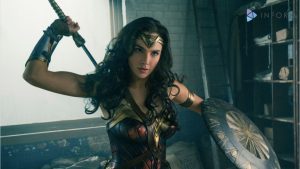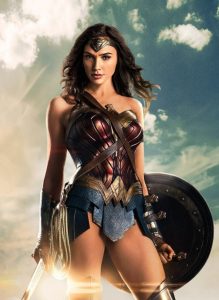
Let’s Talk About Sex Baby….

There is something so relaxing about sitting down and watching a movie. Everything is still. Everything is dark. You’re probably sitting with a good friend or a loved one. You’re eating your favorite candy or some tasty, buttery popcorn. There is nothing to do except sit back, relax, and enjoy the show in front of you for the next two to three hours.
As I sat down in my friend’s common room to watch Wonder Woman, the dorm was pitch black except for the exit sign that dimly lit a corner of the room. Being a young lady attending a liberal college, I was particularly excited to see this movie. Many of my friends who had seen the movie claimed that Wonder Woman was a huge step forward for empowering women and promoting equality between the genders. With movie director, Patty Jenkins, and the majority of staff for the movie being female, Wonder Woman is a highly renowned action packed movie that pushed for changing the way women are depicted in Hollywood cinemas. Madeleine Vall, who played one of the Amazons in the movie, told the Huffington Post, “Being a female thai and kick boxer I’ve been in a man’s world for the last decade so being around this many women was completely new to me” (Ferguson). Brooke Ence, who also played an Amazon in the movie added, “ Everyone just walked with more power, with this Amazonian vibe” (Williams). That being said, I sat down fully expecting to be left feeling so proud of my gender and empowered by the huge strides that were made because of this movie.
 However, within ten minutes of watching the movie, I was already shocked by what I had observed, and ultimately by the accompanying feelings that remained. Everything about Wonder Woman screamed sex. The most obvious sexualized part of Wonder Woman was the heroine’s outfit. How much more sexualized could the creators have made a superhero’s outfit? Wonder Woman is barely dressed. She is clad in a tight fitting body suit with high boots and fitted breast cups: not the ideal uniform for fighting in World War I. Her appearance is more suitable for a strip club, which is how she was perceived by many of her male admirers. After Diana (Wonder Woman’s human name) throws a man across the bar, Sameer comments that he doesn’t know whether to be frightened or aroused. This joke shows that even as Diana proves her physical superiority over all men, she still isn’t truly viewed as a threat by other males. Her beauty overshadows this and as a result, she becomes objectified by the males in the movies and the audience. The first time Diana puts on her super suit, the camera zooms in on her straight on. Her cleavage is extremely apparent to the audience and her breasts are almost busting out of her outfit. The editors choice to portray Diana’s first real appearance in this view and to continue to give Diana a close up on her cleavage proves the fact that Wonder Woman does not truly tell a story about a heroine, but more about how physically alluring women can be.
However, within ten minutes of watching the movie, I was already shocked by what I had observed, and ultimately by the accompanying feelings that remained. Everything about Wonder Woman screamed sex. The most obvious sexualized part of Wonder Woman was the heroine’s outfit. How much more sexualized could the creators have made a superhero’s outfit? Wonder Woman is barely dressed. She is clad in a tight fitting body suit with high boots and fitted breast cups: not the ideal uniform for fighting in World War I. Her appearance is more suitable for a strip club, which is how she was perceived by many of her male admirers. After Diana (Wonder Woman’s human name) throws a man across the bar, Sameer comments that he doesn’t know whether to be frightened or aroused. This joke shows that even as Diana proves her physical superiority over all men, she still isn’t truly viewed as a threat by other males. Her beauty overshadows this and as a result, she becomes objectified by the males in the movies and the audience. The first time Diana puts on her super suit, the camera zooms in on her straight on. Her cleavage is extremely apparent to the audience and her breasts are almost busting out of her outfit. The editors choice to portray Diana’s first real appearance in this view and to continue to give Diana a close up on her cleavage proves the fact that Wonder Woman does not truly tell a story about a heroine, but more about how physically alluring women can be.
Therefore, in order to see if this movie was truly a testament to equality of the genders, I watched this movie looking purely for the story of the genders. How different would this movie have been if the genders were reversed and Wonder Woman was a man? The answer lies in how the editors depict the females versus the males. According to Laura Mulvey, Hollywood cinema, in particular, treats the camera as though it were male. It compels all its viewers to see through male eyes. Keeping this idea in mind, there are many scenes in Wonder Woman that support Mulvey’s theory.
As Diana enters the world, she immediately draws attention because of her beauty and as a result, attracts the attention of all males. Just walking down the streets of London, Diana makes many men’s heads turn to check her out. When Diana sees a couple holding hands, she grabs Steve’s hand even though they are not together. She has no idea what holding hands truly means, but her instinct is to assume the role of other women in this world and accept their behaviors.
Additionally, as a female, women are expected to bear children and serve as a mother figure for a family. When a child is present on the streets of London, Diana suddenly sheds her image of a fearless soldier and chases the child while cooing “Oooo a baby!” The scene is quick but very telling of how Hollywood views the ideal family. The camera shows Steve looking on as Diana reaches out for the baby, which evokes almost a wistful feeling among the audience. Diana and Steve were an ideal image of a family in that scene. Diana’s mission to defeat Ares was quickly forgotten in this moment when she saw the baby. Again, the editors choice to portray Diana and Steve from this angle promote the ideal image of a male being the head of a family with the female mothering the child.
This sexuallization of Diana even extends to her fighting stlye. Her use of a lasso to fight could be scene as a whip which is also used as a kinky sex toy. The camera focuses on her aggressively whipping males around with her lasso during battle scenes, which many males might find to be a turn on. The close up of her flipping her hair after fighting especially makes the whole act of fighting less violent and more sexual. Therefore, although she is in a battle scene fighting for her life, Diana is still depicted as a sex symbol to the audience.
https://www.youtube.com/watch?v=Yrdih26Dv_g
The clear shift in her persona is apparent as soon as she leaves her paradise island and enters the real world. The camera’s lense becomes a lot darker and more dreary looking. The weather is almost always a storm and the sky is continuously gray. Through this transition of lighting the director reveals that this kind of peaceful matriarchal society cannot exist in the real world. Once men are present in the world, women’s roles become a lot more oppressed and fade into the background. Even Diana admits to Steve that, “Males are necessary for procreation”. Her own birth would not have been possible without the power of Zeus. A world like the Amazon’s is unrealistic because of the natural roles that women are assigned to such as motherhood and physical pleasure for the males.
The movie definitely attempts to push forward the idea that females can fight and hold their own against males. Diana is by no means your typical “girly girl”. However, the director’s attempt to create a totally feminist superhero is futile in this film. As my friend and I neared the end of the movie, a group of guys walked through our common room. When they saw we were watching Wonder Woman. Both of them broke into giddy smiles and said, “I would totally bang Wonder Woman.” Their comments led me to the realization that Mulvey was correct when she claimed that Hollywood cinema took a male perspective while filming movies. Wonder Woman was very sexualized from the start. Her gender constantly overshadowed her superhero status, and it ultimately showed that males will always be the dominating figure in movies. People go to the movies so that they can share this male dominating perspective. They live vicariously through the camera to look in on this world much like a peeping tom (English 117). Therefore, once you look past the plot of the story and focus in on how each gender is behaving, Wonder Woman is not a feminist movie. In fact, everything Wonder Woman does and wears is the opposite of promoting feminist goals, proving that Hollywood is sexist. Wonder Woman as well as many other Hollywood films continue to give in to gender stereotyping. Perhaps Hollywood will never fully achieve equality between the genders in their movies until the gender of the characters is almost indistinguishable. Until then, we will continue to watch movies and drift off into a world where we can adopt this male dominating attitude of sexualizing women. Wonder Woman and other Hollywood films will continue to be comparable to a source porn for the audience.
Works Cited
English 117
Ferguson, Christopher J. “Wonder Woman As A Feminist Hero.” The Huffington Post,
TheHuffingtonPost.com, 26 June 2017,
www.huffingtonpost.com/entry/wonder-woman-as-a-feminist-hero_us_595088c3e4b0326c0a8d099b.
Jenkins, Patty, director. Wonder Woman. Warner Bros., 2017. Film.
Williams, Zoe. “Why Wonder Woman Is a Masterpiece of Subversive Feminism.” The Guardian,
Guardian News and Media, 5 June 2017,